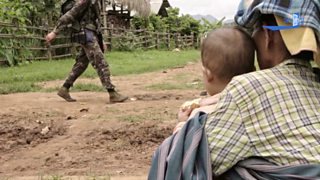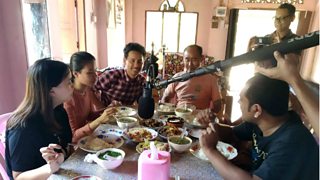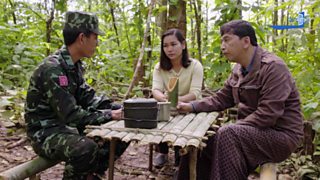Bridging divides: Radio and TV as a force for good in Myanmar
Caroline Nursey
Chief Executive Officer, �������� Media Action
On International Day for Tolerance, hear from our Chief Executive Officer, Caroline Nursey, about how we’re fostering mutual understanding and tolerance between diverse communities in Myanmar through media.

An ethnic armed group soldier walks through a village in Kayah state, Myanmar
In many countries across the globe, we’ve seen a worrying increase in media being used to stoke tension and hate. I recently returned from a trip to Myanmar, which is sadly no exception. When divisions are already raw, media can be used to fuel conflict and further fragment societies.
But at �������� Media Action, we strongly believe that media can be a force for good when it comes to reconciling viewpoints, promoting open and inclusive dialogue, and bridging these divides.
Myanmar is a country facing deep and complex internal division. While there is a nationwide ceasefire agreement between the government and ten ethnic armed groups, conflict is still an ever-present threat in much of the country. It’s in this context that our weekly radio drama, Tea Cup Diaries, comes in.
Tea shops in Myanmar have a reputation for welcoming people from all walks of life and backgrounds. Over tea, customers can share their opinions, problems, hopes and dreams and, in the process, open themselves up to new points of view.

Recording scenes for our peace-building radio drama, Tea Cup Diaries
Our drama, set in a busy tea shop on the outskirts of Yangon, reaches millions of people in towns and villages across Myanmar. Its diverse characters enjoy animated but peaceful conversations on topics ranging from family relationships to conflict resolution.
The show aims to foster openness and respect for people from all ethnic and religious backgrounds, and our recent research showed that listeners have been encouraged to be more open to social interaction with people of different religions, including Islam.
It also revealed that listeners are beginning to understand the importance of not discriminating against others. They even aspire to inter-religious friendships, like those portrayed in the drama.
Building on this success, last year we embarked on an even more ambitious project: addressing social divisions through TV and social media, while vividly depicting the different and vibrant cultures of Myanmar.

Democratic activist and dissident, Min Ko Naing (right), meets Colonel Mayal from Karenni National Progressive Party in Kayah state to learn about his perspective on the conflict
Our project Khan Sar Kyi, which means ‘feel it’ in Burmese, showcases diverse perspectives on Myanmar identity and aims to increase audience understanding of the causes of conflict, and potential solutions.
Through TV documentaries, live discussion events and innovative digital content, the project is engaging audiences who would normally tune out from politics, whilst also involving the political actors currently driving the formal peace process.
Every documentary episode follows a person in power – often an MP or community leader – as they travel to a different part of Myanmar to learn about the lives of the local people, and how they experience conflict.
A powerful example is this clip in which retired General Myint Soe (from the former ruling political party) travels to Kachin state in the north, which has been plagued by civil war since 2011. There he meets a grandmother, daughter, and baby granddaughter in a camp for internally displaced people, to understand how their lives have been turned upside down:
Short clip from an episode of Khan Sar Kyi (Feel It) in Kachin, Myanmar
Complex political and ethnic divisions won’t be solved overnight. But it’s encouraging to know that from our early audience research – 91% of regular viewers of Khan Sar Kyi feel they have learnt something from the show, and 65% have discussed what they have seen with others.
I’m deeply proud of our team in Myanmar for delivering this important work and contributing to a more cohesive, peaceful and democratic future for the country. Opening these conversations and providing space for peaceful, tolerant discussion demonstrates how trusted media can help reverse the tide of conflict, rather than exacerbate it.
--
Caroline Nursey is Chief Executive Officer for �������� Media Action.
Our Tea Cup Diaries project launched in 2015 and is currently in its eighth season, funded by NORAD.
Our Khan Sar Kyi (‘Feel It’) project is funded by the Joint Peace Fund.
